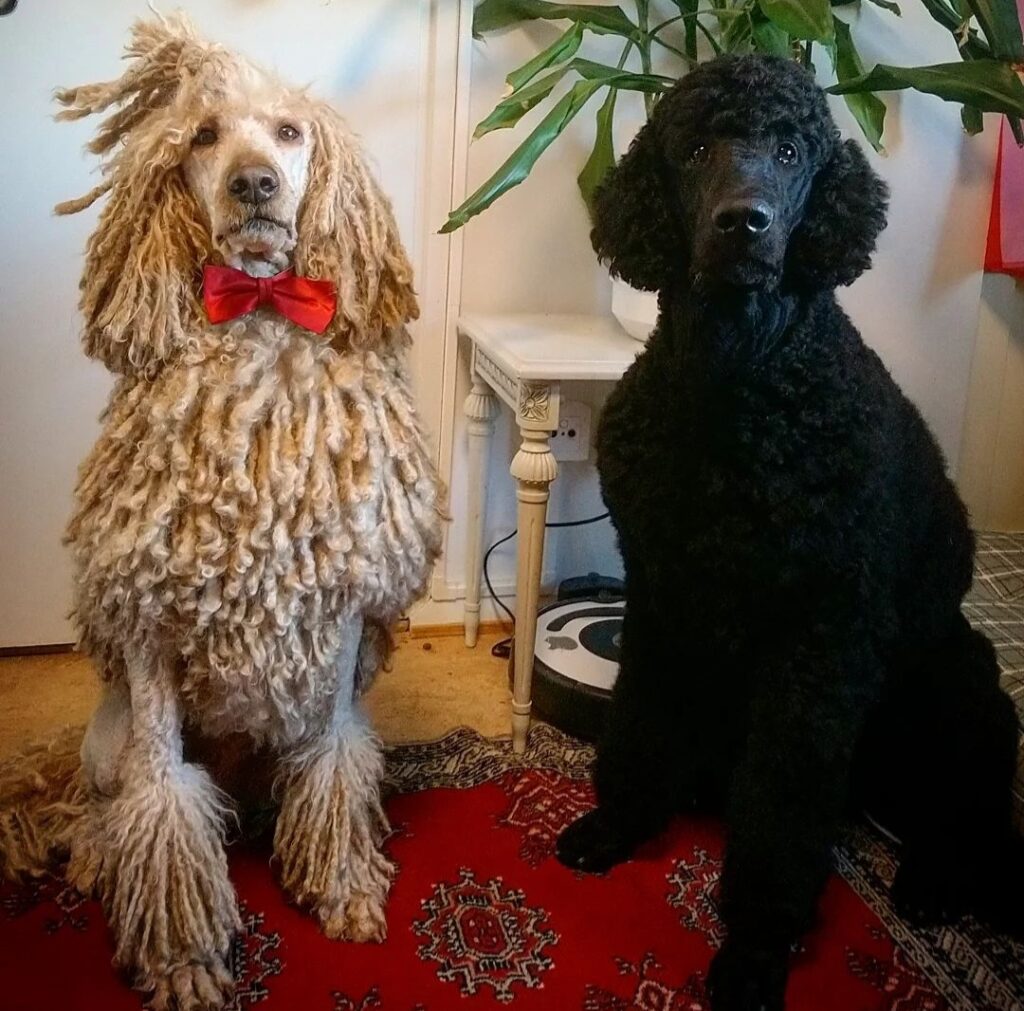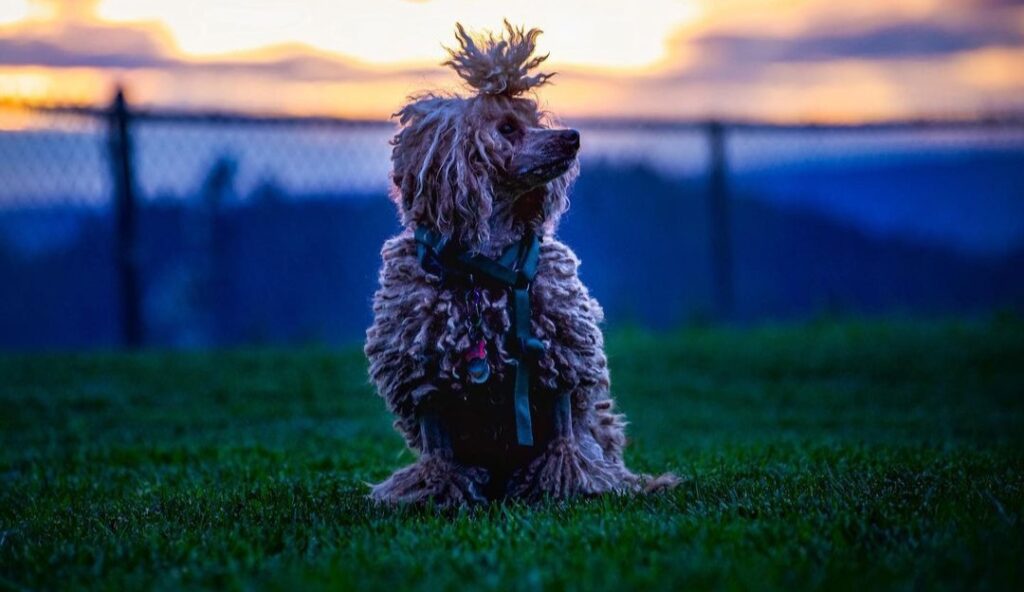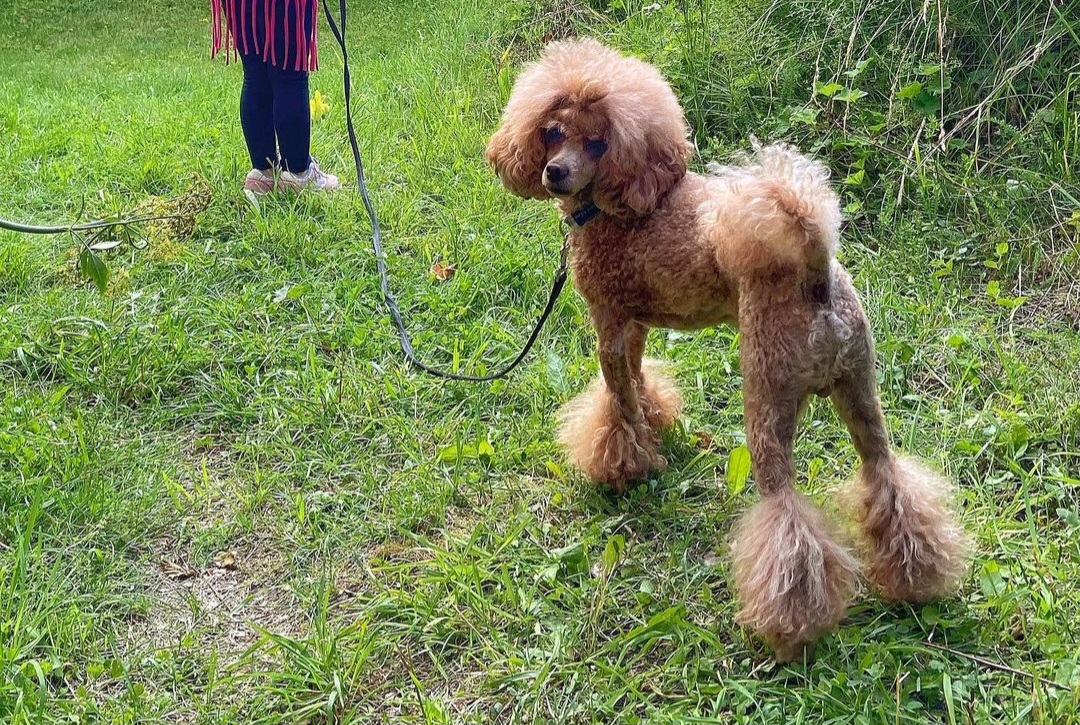Corded Poodles: A Guide to Their Unique Coat Style
Corded Poodles are a sight to behold – their unique and striking appearance sets them apart from other dog breeds. With their thick, matted cords of hair, these poodles are not only visually stunning, but also incredibly intelligent and loyal companions. The AKC Komondor standard states that the adult Komondor should be entirely covered with a heavy coat of tassel-like cords that are felt-like to the touch. Corded Poodles must still be shown in one of the approved Poodle clips for the AKC ring. Most corded Poodles are shown in the Continental clip.
Whether you’re looking for a show-stopping addition to your family or a faithful friend to share your adventures with, Corded Poodles are sure to impress. Moisture helps tighten cords and control frizz (which is why you’ll often see corded dog owners with a spray bottle at a dog show) but when getting a corded coat started, regular baths help get mats, or “future cords,” established and clean.
What is a Corded Poodles?
Corded Poodles are a unique type of Poodle that has a coat that has been allowed to grow naturally and then formed into cords or ropes through a process called corded grooming. This process involves separating the Poodle’s coat into sections and twisting each section into a cord. Corded Poodles have a unique and distinct look that sets them apart from other Poodle breeds.
Cording is not a common grooming style for Poodles, and it requires a bit of time and effort to maintain. Cording is achieved by allowing the Poodle’s coat to grow naturally and then separating it into sections and twisting each section into a cord. The cords are then allowed to grow and are maintained through regular grooming.
Corded Poodles have a unique coat that requires special care and maintenance. The cords can become tangled and matted if not properly cared for, and they require regular grooming to keep them looking their best. Corded Poodles also require regular bathing to keep their coat clean and healthy.
Corded Poodles are a unique and fascinating breed that requires a bit of extra care and attention to maintain their distinctive look. If somehow you’re considering getting a Corded Poodle, it’s important to understand the grooming requirements and commitment required to keep them looking their best. With proper care and attention, a Corded Poodle can make a wonderful and unique addition to any family. Corded Poodles always attract a lot of attention on National Purebred Dog Day’s pages, and for good reason: They’re spectacular!
Read: Teacup Poodle
History of Corded Poodles

Corded Poodles have a long history that dates back to at least the 17th century. The Poodle is believed to have originated in Germany, though some cynologists believe it originated in France. Poodles come in all shapes and sizes, as well as with various hairstyles. One such hairstyle is known as cording (or, essentially, dreadlocks).
In the 1800s, corded Poodles were a common sight and were even divided into corded and non-corded divisions at dog shows in the UK between 1903 and 1906. However, the corded coat style fell out of favor in the 20th century and became less common. Today, you’ll still occasionally see a Poodle with a corded coat, but it is not as popular as other styles.
The corded coat style is a unique look that requires a bit of time to do and maintain. It involves separating the hair into cords and allowing them to mat together to form dreadlocks. The cords are formed by backcombing the hair and then allowing it to mat together over time. The process can take months, and the cords must be maintained regularly to prevent them from becoming too heavy and causing discomfort to the dog.
Despite the time and effort required to create and maintain a corded coat, many Poodle owners find the unique look to be worth it. Corded Poodles are often seen in dog shows and competitions, where their distinctive appearance can help them stand out from the crowd. However, it is important to note that the corded coat style is not for everyone. It requires a lot of care and attention, and may not be suitable for all dogs or owners.
Physical Characteristics of Corded Poodles
Corded Poodles are a unique and interesting breed of dog. They are known for their distinctive corded coat, which gives them a unique and stylish appearance. We will discuss some of the physical characteristics of Corded Poodles, including their size, weight, coat, and colors.
Size and Weight
Corded Poodles come in three different sizes: Standard, Miniature, and Toy. The Standard Corded Poodle can grow up to 24 inches tall and weigh between 40 and 70 pounds. The Miniature Corded Poodle can grow up to 15 inches tall and weigh between 15 and 17 pounds. The Toy Corded Poodle can grow up to 10 inches tall and weigh between 6 and 9 pounds.
Coat and Colors
Dog coats come in a variety of colors and textures, from short and smooth to long and fluffy. The most distinctive physical characteristic of Corded Poodles is their coat. The corded coat is made up of long, curly or wavy hair that has been allowed to grow naturally and then twisted into cords or ropes through a process called corded grooming. The cords can be anywhere from pencil-width to several inches thick, depending on the desired look.
Corded Poodles come in a variety of colors, including apricot, black, blue, brown, cream, gray, red, silver, and white. Some Corded Poodles may have a solid color coat, while others may have a combination of colors. Understanding the difference between a corded Poodle coat is essential for achieving the desired look and maintaining the health and comfort of the dog.
Read Also: Moyen Poodle
Temperament of Corded Poodles
Corded Poodles are known for their intelligence, friendliness, and active nature. They are highly trainable and eager to please their owners, making them a popular choice for families with children.
As with all Poodles, Corded Poodles have a mischievous streak that can make them a lot of fun to be around. They love to play and are always up for a game of fetch or tug-of-war. They are also known for their sense of humor and can be quite entertaining to watch.
Corded Poodles are generally good with other dogs and pets, but early socialization is key to ensure they get along well with others. They are also good with strangers, although they may be reserved or aloof at first.
Because of their high intelligence, Corded Poodles require mental stimulation in addition to physical exercise. Puzzle toys and training games can help keep their minds sharp and prevent boredom.
Health and Lifespan of Corded Poodles
Corded Poodles are a relatively healthy breed with a lifespan of 12 to 15 years. However, like all dog breeds, they are prone to certain health issues.
Common Health Issues
One of the most common health issues in Corded Poodles is hip dysplasia, which is a genetic condition that causes the hip joint to develop abnormally. This can lead to arthritis and lameness in the affected leg. Other common health issues in Corded Poodles include:
- Progressive retinal atrophy (PRA): a genetic condition that causes the retina to degenerate, leading to blindness.
- Epilepsy: a neurological disorder that causes seizures.
- Von Willebrand’s disease: a bleeding disorder caused by a deficiency of clotting factor.
It is important to note that not all Corded Poodles will develop these health issues, and many can be prevented or managed with proper care and regular veterinary check-ups.
Life Expectancy
The lifespan of Corded Poodles varies depending on their size. Toy Poodles generally live the longest, with an average lifespan of 12 to 15 years. Miniature Poodles typically live between 10 to 12 years, while Standard Poodles can live anywhere from 10 to 18 years.
To ensure that a Corded Poodle lives a long and healthy life, it is important to provide them with a high-quality diet, plenty of exercise, regular veterinary check-ups, and proper grooming. Corded Poodles require regular grooming to prevent matting and to maintain their unique coat. This grooming can be done at home or by a professional groomer.
Caring for Corded Coat
Corded Poodles are a unique and distinctive breed that require special care to keep their long, rope-like cords in good condition. Here are some tips on how to care for your Corded Poodle to ensure they stay healthy and happy.
Grooming Needs
Corded Poodles require regular grooming to maintain their cords and prevent matting. This includes brushing and combing their coat regularly to remove any tangles or knots. You should also bathe your Corded Poodle regularly to keep their coat clean and healthy.
In addition to regular grooming, Corded Poodles require special grooming techniques to maintain their cords. This involves separating the hair into sections and twisting each section into a cord. The process can take several months to complete and requires regular maintenance to keep the cords in good condition. The younger the dog, the shorter the coat, and the more challenging it is to get “purchase” on the coat. Poodle hair grows, however, and gaining the upper hand does get easier. Puppy coat forms the core of the “cord” so that the adult coat can clump and cluster around the core eventually creating a felted mat. The separation of those mats create cords.
Exercise Requirements
Corded Poodles are an active breed that require regular exercise to stay healthy and happy. They enjoy a variety of activities, including walking, running, playing fetch, and swimming. You should aim to provide your Corded Poodle with at least 30 minutes of exercise per day, although more may be required depending on their age, weight, and activity level.
Dietary Needs
Corded Poodles require a balanced and nutritious diet to stay healthy and maintain their coat. You should aim to provide your Corded Poodle with a high-quality dog food that is rich in protein, vitamins, and minerals. You should also ensure that your Corded Poodle has access to fresh water at all times.
In addition to a balanced diet, Corded Poodles may benefit from supplements that support coat health. This includes supplements that are rich in omega-3 fatty acids, which can help to promote healthy skin and coat. You should consult with your veterinarian before adding any supplements to your Corded Poodle’s diet.
Overall, caring for a Corded Poodle requires time, patience, and dedication. By providing your Corded Poodle with the proper grooming, exercise, and dietary care, you can help to ensure that they stay healthy and happy for years to come.

Check: What is a King Poodle
Training Corded Poodles
Training a corded Poodle is not different from training any other Poodle. Corded Poodles are intelligent and eager to please their owners, which makes them easy to train. However, they can be stubborn at times, so consistency and patience are key.
Basic obedience training
Basic obedience training is the foundation of all dog training and is necessary for every dog, including corded Poodles. It includes commands like sit, stay, come, and heel. These commands will help you establish yourself as the leader of the pack and make it easier to train your Poodle in the future.
Socialization
Socialization is also an important aspect of training a corded Poodle. It involves exposing your Poodle to different people, dogs, and environments to make them comfortable in different situations. Socialization should start at a young age and continue throughout their life.
Grooming training
Grooming a corded Poodle is a time-consuming process that requires patience and skill. It is important to start grooming your Poodle at a young age to get them used to the process. You should also make sure to use positive reinforcement during grooming sessions to make it a positive experience for your Poodle.
Advanced training
Corded Poodles are highly trainable and excel in advanced training, such as agility, obedience, and tracking. These activities provide mental and physical stimulation for your Poodle and strengthen your bond with them.
Breeding Corded Poodles
Breeding corded Poodles is a specialized task that requires patience and expertise. Corded Poodles are not as common as other Poodle varieties, and the breeding process requires careful consideration of various factors to ensure that the resulting litter is healthy and meets breed standards.
One of the most important factors to consider when breeding corded Poodles is their coat. Corded Poodles have a unique coat that requires special attention and grooming, and it is important to select breeding pairs that have the right type of coat. Breeders should select Poodles with thick, curly coats that are free of tangles and mats. Additionally, the coat should be of good texture, as this will help the cords form properly.
Another important factor to consider when breeding corded Poodles is their temperament. Corded Poodles are known for their intelligence, trainability, and affectionate nature. It is important to select breeding pairs that exhibit these traits, as they will be passed on to their offspring.
When breeding corded Poodles, it is also important to consider their health. Like all dog breeds, Poodles are susceptible to certain health conditions, and it is important to select breeding pairs that are free of genetic disorders. Breeders should conduct health screenings on their breeding dogs to ensure that they are healthy and free of any genetic conditions that could be passed on to their offspring. Standard Poodle puppies are adorable and full of energy.
As you can see, breeding corded Poodles requires careful consideration of various factors to ensure that the resulting litter is healthy and meets breed standards. Breeders should select breeding pairs based on their coat, temperament, and health, and should work with a veterinarian to ensure that their dogs are healthy and free of genetic disorders. With the right approach, breeding corded Poodles can be a rewarding and fulfilling experience for breeders and owners alike.
Corded Poodles and Families
Corded Poodles can make great pets for families, provided that the family is willing to put in the time and effort to properly care for their unique coat. Here are some things families should consider before bringing a Corded Poodle into their home:
Grooming
Corded Poodles require a lot of grooming to maintain their cords. This includes regular brushing, bathing, and trimming to prevent matting. Families should also be prepared to invest in professional grooming services to ensure that their Poodle’s coat stays healthy and looking its best.
Exercise
Corded Poodles are active dogs and require regular exercise to stay healthy and happy. Families should be prepared to provide their Poodle with daily walks and playtime to prevent boredom and destructive behavior.
Temperament
Corded Poodles are known for their intelligence, loyalty, and affectionate nature. They make great family pets, but families should be prepared to provide their Poodle with plenty of attention and socialization to prevent separation anxiety and other behavioral issues.
Allergies
While Corded Poodles are often recommended for families with allergies, it’s important to note that no dog is completely hypoallergenic. Families with allergies should spend time with a Corded Poodle before bringing one into their home to ensure that they don’t have an adverse reaction.
There is no doubt that, Corded Poodles can make great pets for families who are willing to put in the time and effort to properly care for them. With their unique appearance and affectionate nature, they can be a great addition to any family.

